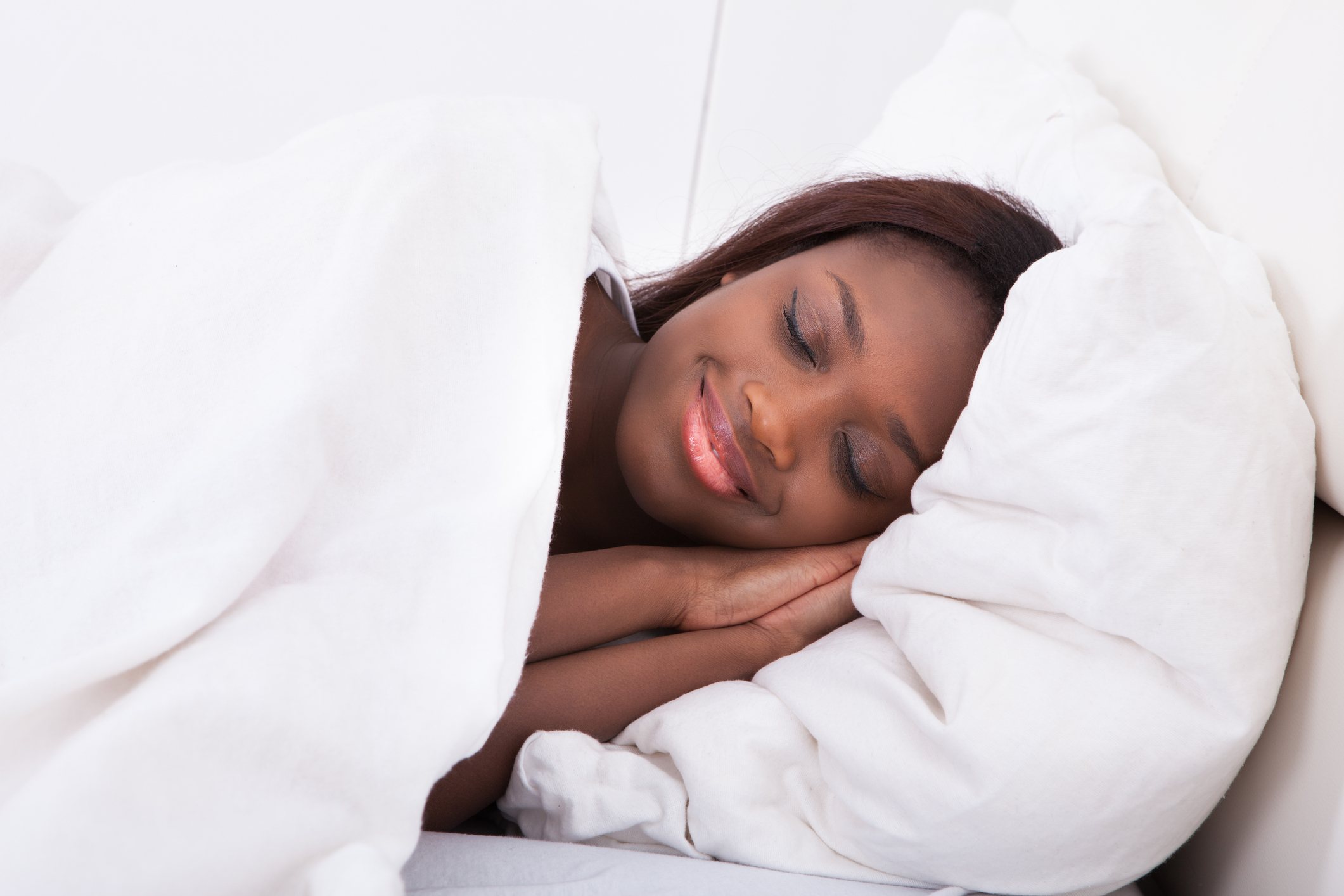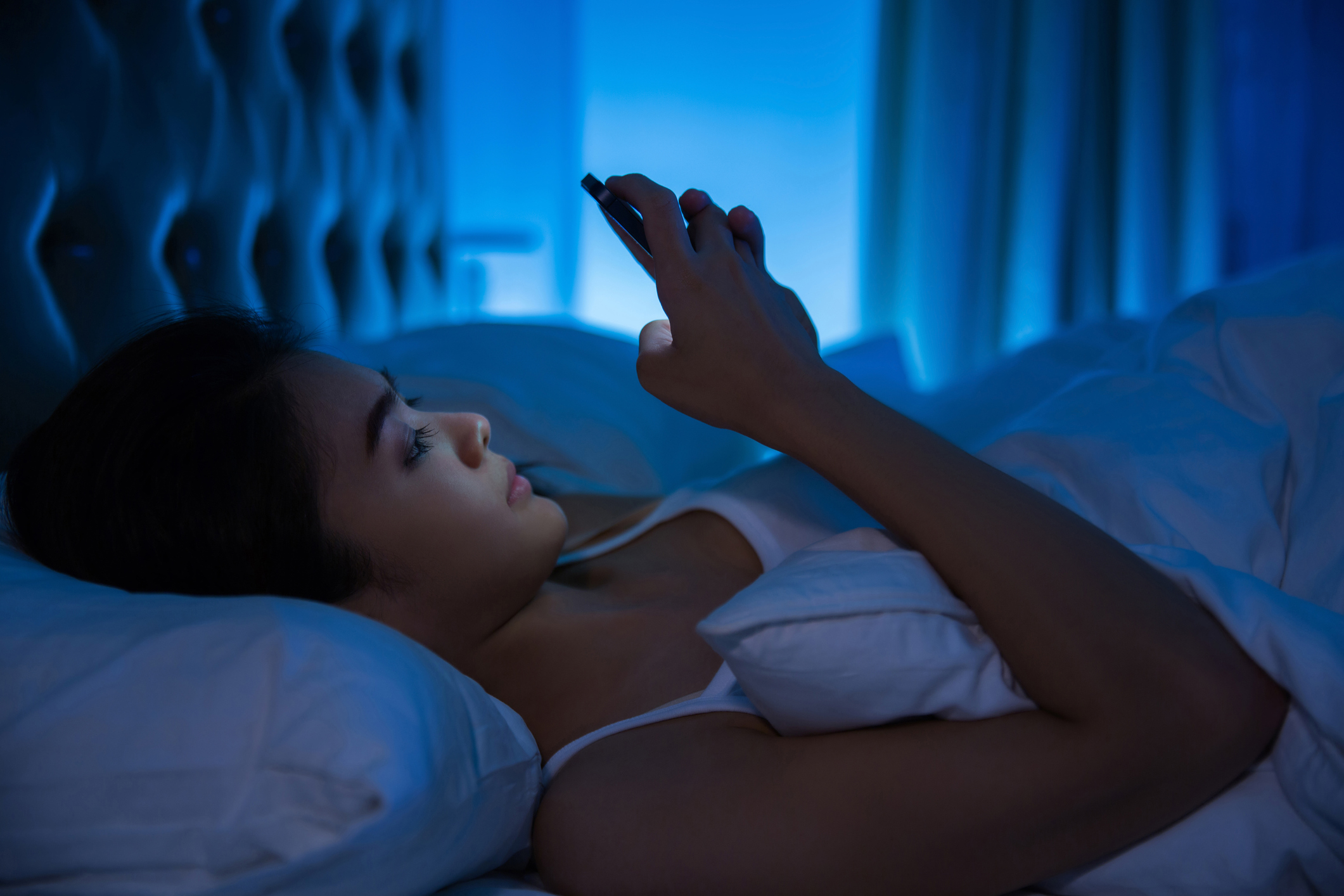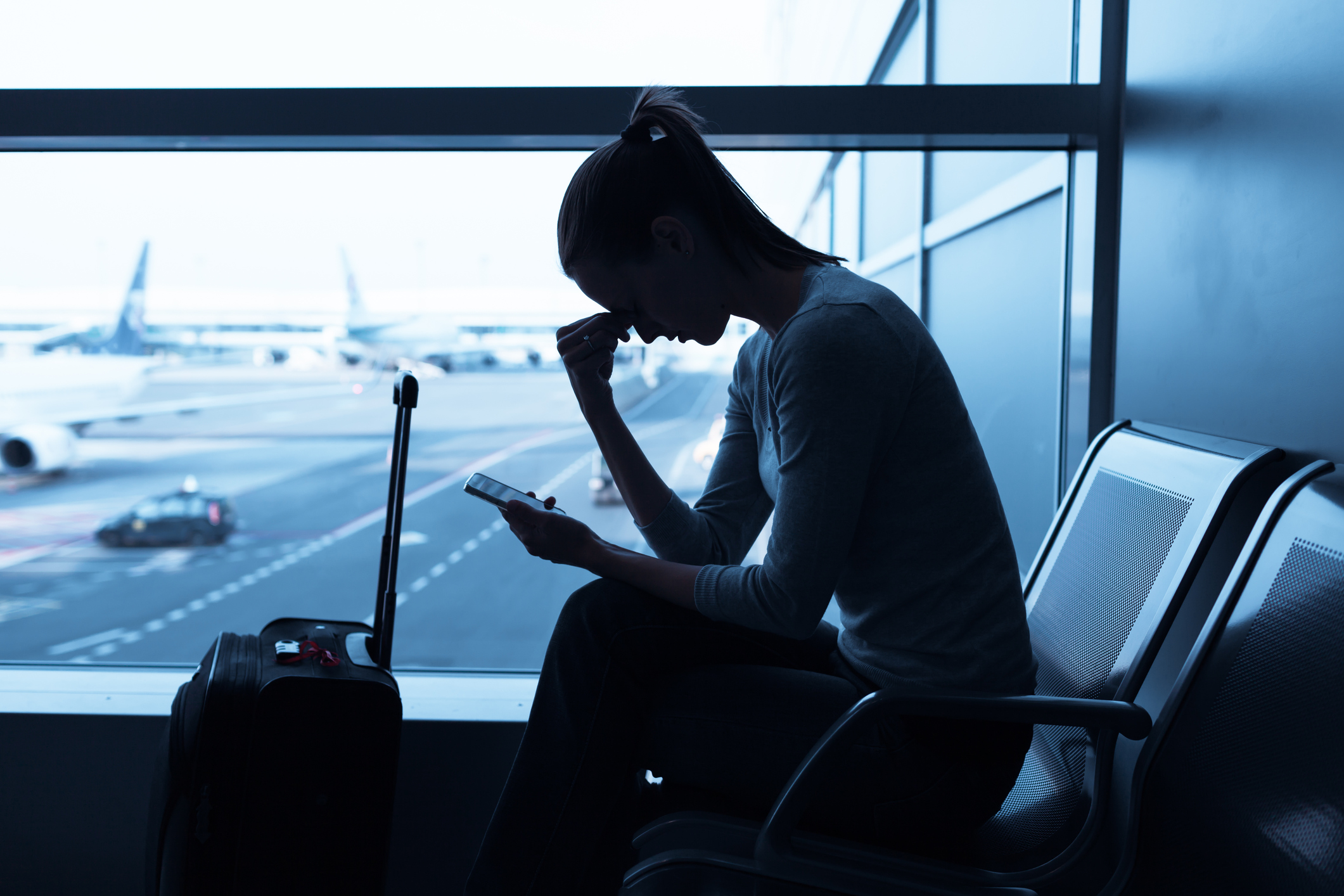This post may contain affiliate links.
Sleep is an easy thing to neglect. There is no denying the world around us is overworked and overstimulated.
Taking the appropriate amount of time at night to get some shut eye without any disturbances may sometimes seem impossible. There’s so much to do, so much to see, so much happening on TV and in the news and on our social media feeds.
Before we know it – we’re awake well into the wee hours of the night, stimulated by everything going on around us and putting off the sleep that our bodies really need.
Of course, sleep is important to overall health for everyone, at every stage in life. But if you’re struggling with amenorrhea or an irregular menstrual cycle, getting the sleep you need is especially important to help get your period back on track.
Learn how to get your period back WITHOUT birth control in my FREE TRAINING!
How Circadian Rhythms Affect Hormones
Our Circadian Rhythm is to blame for how our hormones react when we sleep or when we don’t sleep. A “circadian rhythm” is the umbrella term used for a 24-hour cycle that impacts almost every system in our body, as well as all other creatures’ bodies. As humans, we have adapted to be awake and functioning during the daytime and resting with sleep at night.
A perfect circadian rhythm would be accompanied by a series of hormones that allow us to be energetic and alert when the sun is shining, and achieving deep sleep throughout the night when the sun has gone down. This perfect scenario would further promote the ideal metabolism of food, brain function, as well as reproductive health.
Learn more about circadian rhythms in my interview with Dan Pardi.
There are a lot of things that may alter your circadian rhythms. These things can be biological (like illness or medical conditions) or environmental (such as stress). The important thing that we want to focus on, though, is the behaviors around bedtime that synchronize your circadian rhythms in an ideal way.
That’s because sleeping in alignment with our circadian rhythms can actually help fight illness, chronic diseases, stress, and of course benefit a regular menstrual cycle.
Sleep and Your Period
If you are suffering from hypothalamic amenorrhea, you may have heard the names of some various hormones that have been shifted or are of concern as you find your way to recovery. As mentioned, sleep deprivation and altered sleeping patterns will affect some of these hormones.
Those of particular interest are TSH (Thyroid Stimulating Hormone), LH (Luteinizing Hormone), FSH (Follicle Stimulating Hormone), Estradiol, and Prolactin – to name a handful. Some of these hormones have been found in research to have circadian rhythms of their own.
Here are some of these important hormones and how sleep loss affects them:
- TSH
- Increases with acute sleep deprivation, which is related to anovulation.
- Chronic sleep deprivation and insomnia are not shown to increased TSH
- LH
- Increases with partial and total sleep deprivation, which is associated with infertility
- FSH
- Increases with “sleep dysrhythmia” – e.g. those who work a night shift or find themselves sleeping more during the day than at night
- Increased FSH levels are associated with poor ovarian reserve and reproductive aging.
- Estradiol
- Partial sleep deprivation is shown to increase levels, where variable and changing sleep patterns is shown to decrease levels
- Irregular secretion is associated with anovulation
- Prolactin
- Increases with night eating, or consuming a bulk of your calories after dinnertime.
- An increase may indicate anovulation, PCOS, endometriosis
Unless you are chronically sleep deprived, it is probably not likely that a loss of a period would caused by poor sleep hygiene alone.
But it’s important to note how these hormones can be negatively impacted by sleep loss, and how important getting quality sleep is to our reproductive health when it comes to hormone secretion and regulation.
Learn how to get your period back WITHOUT birth control in my FREE TRAINING!

How to Sleep Better Every Night
Let’s review some strategies that make a big impact on your sleep hygiene. You may not even realize how useful these tips can be until you try them out!
If you even feel slightly groggy in the morning and are wondering if you’re getting good rest, or you’re just hoping to improve your sleeping patterns – try the following strategies.
Goal #1: Have a Consistent Bedtime
Set yourself a reasonable bedtime! It may sound silly or too simple, but this tip can really help get you practicing good sleeping habits. If you find yourself distracted by work, family matters, or social media, time can slip away, and you may find yourself heading to bed at a different time each night.
Unless you dictate your own work schedule, your alarm is set and going to ring every morning at the same time, whether you like it or not! If you know what time you need to wake up in the morning, it’s just as important to know what time you should be falling asleep at night. This will assure that you’re getting adequate hours of sleep.
Studies suggest that different age groups have differing required sleep time, but a good number to shoot for is about 7-9 hours a night. That means that you should aim to get a minimum of 7 hours every single night, no matter how old you are.
Once your bedtime is set, it’s important to stick to it. If you find yourself saying “Yes” to multiple activities that run late into the night and go beyond your bedtime, you’re going to be missing out on crucial sleep.
There’s no way to catch up on sleep, either.
Sleeping for 12 hours during a weekend will not make up for chronic sleep deprivation throughout your workweek. Your circadian rhythm, unfortunately, does not accept “IOU”s! Sleeping consistently at night, for the appropriate amount of hours, is the best way to keep your circadian rhythm strong.
Goal #2: always get Ready For Sleep
Preparing your body for rest can definitely help in allowing you to drift off to sleep more easily. Be aware of your surroundings and your own readiness for sleep. This has to do with both environmental and internal cues.
Think about the way you’re currently feeling before bedtime. Just because you’ve set a bedtime doesn’t necessarily mean you’re immediately ready to sleep at that moment.
If you’ve had a stressful or busy day, your body can still be feeling amped up from it. Just because you’re not instantaneously sleepy, that doesn’t mean your body doesn’t need rest.
If you are feeling revved up from your daily activities, find an activity that can help you unwind. Calming activities can be reading, writing, drinking a cup of warm tea, or taking a bubble bath. Find what works for you.

Goal #3: Prepare your environment (and turn those lights OFF!)
Yes! Even the light from your phone!
Try to stay away from bright lights for your pre-bedtime activities. If you can, steer away from scrolling on your phone or watching TV.
Be picky with your sleeping environment. This goes beyond a comfortable mattress and pillow (even though those are important, too!).
Focus on these three things to control and personalize your environment to be more supportive of sleep, if possible: sound, temperature, and light.
Sounds can obviously be a disturbance at night. Any boom or bang can kick you right out of a good sleep, especially if you are sensitive to the noises around you. I experienced this recently when my husband and I were at a hotel and a dog next door was barking intermittently throughout the night. It was SO frustrating and we both slept like garbage, and were exhausted the next day.
Are your windows open, where you can hear unpredictable noises from your neighbors or city? Is your bedroom door open, where a roommate may still be moving around outside? Is your television on?
Minimizing alarming noises can definitely assure that you aren’t being consistently woken throughout the night. If you dislike sleeping in silence or have a difficult time blocking out external noises, white noise is always an option to keep a more consistent tone in your sleeping space. There are white noise machines available for purchase, as well as apps available on smartphones.
Uncomfortable temperatures are to be avoided. You definitely don’t want to be too hot or too cold while you’re trying to sleep. Extreme temperatures lead to a night of tossing and turning – kicking the covers off or trying to find more.
Your sleeping environment temperature is something to optimize, if possible, for reasons other than possible disturbances at night. In some of the deeper stages of sleep, our body’s core temperature decreases. It’s suggested that sleeping at cooler temperatures will help your body more easily transition to those deeper stages of sleep.
The National Sleep Foundation recommends sleeping in a range of 60-67 degrees Fahrenheit. This may sound chillier than normal for you, but adjust with ease! Trickle down your thermostat in steps until you find a temperature that is comfortable for you.
Lastly, sleep in total darkness. Light is the overall driver of how your Circadian Rhythm reacts and responds. Our bodies have adapted to be drowsy and sleep when it’s dark outside. Our optical nerves are sensitive to light, which means that if you’re not sleeping in a dark environment, there is a good chance your circadian rhythm will be altered and your ability to sleep soundly and steadily will be difficult.
This may sound like a silly thing to focus on because it’s likely that most of us sleep in at night when it’s dark. But the thing to remember is that light stimulus can come from things even in a dark room, like our TVs or our phones, or even a crack in our window shades.
When I was in college I used to fall asleep with the TV on. The next morning I’d usually wake up feeling groggy and not as well-rested (no surprise there!) Our brains and bodies were designed to respond to light, whether it’s coming from the sunrise, or if it’s emitted from your TV screen. This happens with our eyes closed or eyes open.
Night after night of leaving the TV on can cause you to fall out of sync with your Circadian Rhythm. If falling asleep with the TV on is something that helps you drift off at night, that is fine – but be sure to set a timer on your TV so the light doesn’t keep you from entering the deeper stages of sleep that are so important to resting.
Be sure that light is not coming from your phone, too. Sleep with it out of immediate eyesight and be sure to put it on Do Not Disturb mode. Most phones have settings and timers that will put your phone on a Do Not Disturb mode at the same time every night.

When You Can’t keep Normal Circadian Rhythms
There is a possibility that your current life circumstances are working against you improving your sleep hygiene. These circumstances are frequently related to work, where you may travel internationally or work the nightshift. These are ultimately things that work against your circadian rhythms because they interfere with the way our brain has been designed to function.
Remember, our brains are designed to shift into sleep when there is no light. Changing the amount of time you are exposed to light, or the lack thereof will shift your body’s response.
While it’s probably not likely that a loss of a period is caused by poor sleep hygiene alone, if you are looking for ways to improve your cycle or regain it, it’s important to understand just how closely connected these pathways are in our brains.
If you have a night shift job, or one that makes you travel through multiple time zones, this could be an area of your life hindering you from getting back a regular menstrual cycle.
If you are planning for a family and fertility, your reproductive hormones will function best when you’re putting in the best practices for good sleep and a proper circadian rhythm.
And while you may not want to quit your job to fix this issue, it’s important to do everything you can to optimize your circadian rhythms in all other areas of your life!
Here’s a great post by Nom Nom Paleo all about Surviving The Night Shift if you can’t control that area of your life.
Correct Your Circadian Rhythms To Improve Your Hormones
Our bodies are meant to rest and recharge at night. By sticking to a bedtime, preparing properly for that bedtime, as well as optimizing your sleeping environment, your brain will be able to shift into sleep mode in order to recharge and be ready for the next day.
A consistent and healthy sleep pattern will align your circadian rhythms, and promote fertility and a regular menstrual cycle.
Have you lost your period and are wondering what you need to do to get it back? Interested in learning more about how sleep impacts your cycle?
Learn how to get your period back WITHOUT birth control in my new FREE TRAINING!
And if you found this article useful, please share it with someone who needs to learn this information!

+ show Comments
- Hide Comments
add a comment